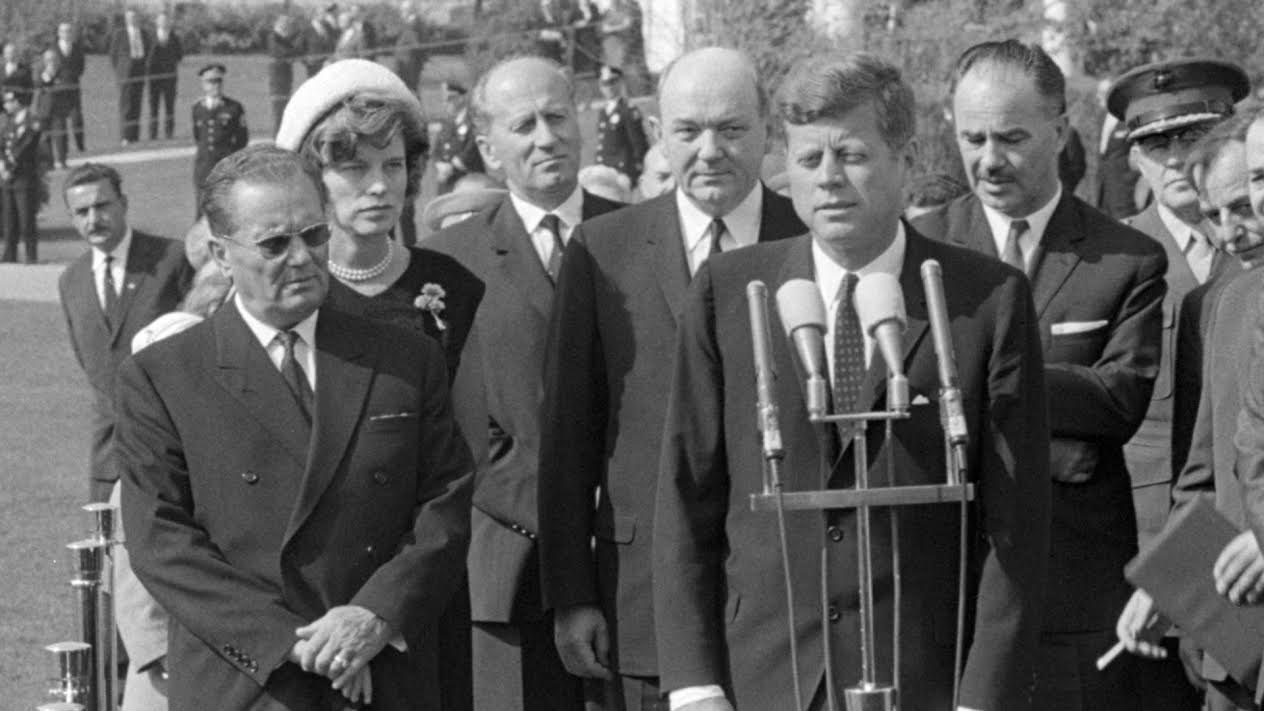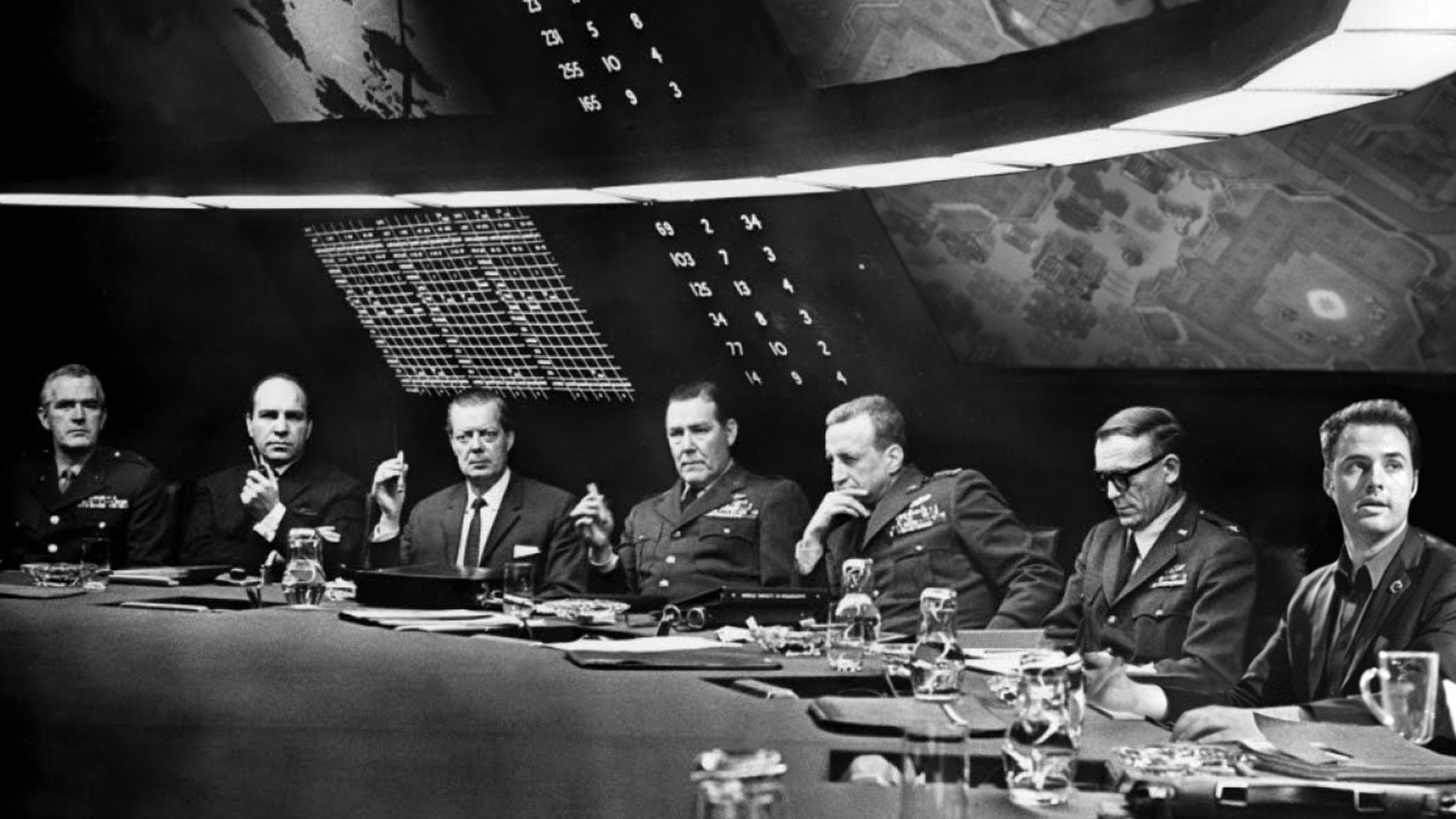
You can almost taste the authenticity in Žiga Virc’s “documentary” Houston, We Have a Problem!
P. Stuart Robinson (1958), is an Associate Professor in Political Science at the University of Tromsø. He is a regular contributor on cultural events for Tromsø’s net publication, Tromsø by.
*
Karlovy Vary 2016: You’re telling me you never heard of the Yugoslav space programme? You don’t believe it existed! Then maybe Žiga Virc’s Houston, We Have a Problem! will set you straight.
How could we have been so naïve? It wasn’t exactly rocket science to figure this one out – if you’ll pardon the expression. It turns out the cleverly hidden Yugoslav space programme was at the centre of everything, from the assassination of JFK to the man on the moon. Trust me, I’ve seen the movie, Žiga Virc’s Houston, We Have a Problem!, shown recently at Karlovy Vary International Film Festival (KVIFF). It all makes perfect sense now, with the sort of iron-clad logic that is the hallmark of any good conspiracy theory.
Meanwhile, the already strange case of Yugoslavia just got stranger. Virc further mystifies an already enigmatic presence in world history. This idiosyncratically socialist and multi-ethnic state survived the epic struggle between capitalism and Stalinism, only to violently unravel in its aftermath. Yet what is really strange is that this film’s wilful muddying of the waters paradoxically helps us understand Yugoslavia a whole lot better. Perhaps it’s true what the filmmaker himself observed as we enjoyed the beautiful setting of a riverside café, shortly after the screening and Q&A, ‘Fiction sometimes tells more about reality than reality itself.’
When reality, and what passes for the news, is really messed up, as it is today, it’s the satirist, the one who deliberately and more or less transparently distorts reality for comic effect, who becomes our most reliable source. Case in point, who would you rather trust: a Fox News presenter or Jon Stewart of the «Daily Show»? In a complex world, filtered and distorted by elites who never balk at furthering their own agenda, Houston, We Have a Problem! is an important invitation to reflection. In this way it gives us some of the tools we need, not just to make sense of Yugoslavia, but pretty much anything else going down in this crazy, mixed-up world of ours.
Right from the onset we’re invited into an intriguing world, an imagined history of unsung rocket-making pioneers and clandestine scientific experiments in obscure Balkan locations. As we watch archive footage of teams of scientists launching rudimentary missiles, we have the impression of entering an inner sanctum. We feel drawn into a real detective operation, a proper investigation of a strangely neglected but entirely credible history, laid open for us by fearless documentarists. After all, the credibility of history is mostly down to the way we imagine it.

You can almost taste the authenticity, as the little known secrets of the Yugoslav space-programme are gradually uncovered. The revelations nevertheless betray the barest but nonetheless unmistakable hint of absurdity, even to the point of a kind of muted slapstick. We are bound to notice, for example, that one of the rockets, after a credible initial climb, is now returning rapidly to earth on approximately the same trajectory. We can only fear for the safety of the inventors – the scientists whose air of technical knowhow and professionalism had inspired our admiration just a moment before.
How to categorise this work – mockumentary, docu-fiction? Call it what we will, it disrupts the boundaries of our accepted categories, explores that murky grey zone we sometimes prefer to ignore between fact and fiction, and like any good documentary, fictional or otherwise, it tells a damned good story. Indeed, it’s a minor masterpiece of plausible fabrication, tracking real events with an unwavering satirical eye, and placing them in a kind of perspective that is at once ridiculous and yet surprisingly illuminating. Above all, it’s a good story in its own terms, a real cinematic ‘page-turner.’
I learned, incidentally, that Virc and his crew are big fans of the late lamented Swedish filmmaker, Malik Bendjelloul, and the work, which has become a kind of contemporary classic of narrative documentary, Searching for Sugar Man, from 2012. I can see shades of Bendjelloul in the kind of attention shown here to narrative structure – and I may not be the only one to make such a flattering comparison. The American sales agent, Josh Braun, who once worked with the Swede, has now picked up this film. He obviously has an eye for a good story, in this case, the story of the Yugoslav space programme.
How long could such a programme remain hidden? Eventually their clandestine activities were discovered – with some alarm – by the Americans. They found a typically American solution to the problem, electing to buy up the whole thing, lock, stock and barrel. It was an audacious move designed to bring the US a step closer to Kennedy’s famous promise to put a man on the moon by the end of the decade. This is where the problems – for both countries – really began, however. With consummate sensitivity, Virc also highlights the human costs of the Yugo-American space cooperation. It is here the film really exhibits its peculiar charm and power. We meet some of the people caught up directly – not to say tragically – in the diplomatic intrigues necessitated by this unlikely international endeavour.

The film mixes actual interviews with honest-to-goodness agents of the Yugoslav state with dramatised ones with fictional – or at least fictionalised – characters. Hence the viewer is challenged to decipher for herself the barely visible seam between fact and fiction. The film has real educational potential. It provides a satirical illustration of the logic of deception in visual media, and thus prompts us to think about how we approach such material as observers. In this way the critical powers of the viewer can and should be engaged. To put it another way, the right sort of questions come to mind. What are the indicators of authenticity? How do we view representations of ‘reality’ in a way that helps us make better sense of what we see?
To underscore the point and doubtless to play a little with what has practically become de rigeur for any serious critical documentary, we have the almost obligatory appearance of the Slovenian philosopher and social commentator, Slavoj Žižek. In a delightfully ambiguous relationship to the content of the film, he expostulates on the hazards laid in our path by the manipulators of our ‘reality.’ It is impossible to tell if he is referring to those who tried to cover up the Yugoslav space programme or those who are trying to convince us that it existed.
Creating a zone of uncertainty within which audiences must actively orientate themselves fulfils the promise of film as the vehicle of intellectual stimulation rather than sedation. The director summed it up in the form of a nice metaphor, as we chatted over coffee, ‘We’re not giving a hungry person a fish, we want to give them a fishing-rod, so they can have a lot of fish then, if they want. But if you’re not trying hard enough, you’re not going to catch any!’
The danger, of course, is that not everyone will entirely ‘get it.’ As the film’s producer and co-writer, Boštjan Virc acknowledges, ‘We are aware that not everyone…will understand the nature of the film.’ At the same time, that very power of deception in action makes an extremely important point, as he goes on to elaborate, ‘If you have one small production like ours, making a film, and adding this hint [to cast doubt] – and people still believe! On the other hand, you have these big news productions, manipulated by companies, by governments, by countries, with no hints that something is wrong in the picture, and people take it for granted – most of it. So what was really fascinating, in a way, was [to discover] that it’s so easy to make people believe… Seeing is believing! Even if what you’re offered is a complete fake! For me, it’s quite scary.’


Yugoslavia was a kind of miracle of its time, perched as it was on the very front line of that simmering, largely subterranean (and submarine) conflict we called the Cold War. Geographically (and strategically), it nestled against the cold comfort of ‘The Iron Curtain’ drawn in 1945 between Eastern and Western Europe. Politically, it was sandwiched between Communists and Capitalists (also with a capital ‘C’): Marxist fundamentalists on one side, market fundamentalists on the other. (Plus ca change..?) Remarkably, Yugoslavia nevertheless managed to keep pretty much on the lee side of such international tensions and intrigue. It was strangely insulated from the worst excesses of the Cold War, as though finding a precarious tranquility in the eye of the storm.
Under the guiding hand of everyone’s favourite ‘benign dictator,’ President (for life) Josip Broz Tito, the country managed to creep out of the dark shadow cast by The Iron Curtain and find a genuine ‘third way.’ This is not to be confused with sociologist Anthony Giddens’s third way – essentially a way for Blairite New Labour to dress their mendacious ‘Thatcherism light’ in social democratic clothes. In view of the intestine forces, which later tore the country apart, Yugoslavia seems even more miraculous. With the gift of hindsight, it seems clear that Tito’s delicate balancing-act was not only between powerful global forces but also domestic ones. Surprisingly it was the latter that proved to be Yugoslavia’s undoing.
The enigma of Yugoslavia was of course deepened by the prevailing culture of secrecy. This partly reflected the natural proclivities of an authoritarian regime, but mostly it was a product of the times. We are talking about a veritable golden age for spies of every style and persuasion, the era – cinematically speaking – of James Bond and Harry Palmer. These were the days of international intrigue, not to mention outright, institutionalised paranoia. The Cold War was probably the most fertile breeding-ground ever for that staple of a civilisation (and educational establishment) grown stale: the conspiracy theory. Never before or since has conspiracy theory been taken to such magnificent heights of muddle-headed thinking. In this respect, Virc has really understood the tenor of the time and captured some of its flavour. His Yugoslavian space conspiracy thus shines a light on the past, ironically enough, through its creative fictionalisation.
Tempus fugit and the profound strangeness of the Cold War is in danger of being forgotten. We of slightly older vintage can nevertheless still recall how conspiracies of all kinds became the order of the day, the new business as usual. They were as much a part of the furniture of the time as all those novel, space-age technologies we loved so much – the nylon shirts, the Velcro, the huge banks of incredibly powerful computers guiding complex operations like rocket flight-paths. In this context, theories of intrigue and hidden agendas lost their character as crackpot, paranoid ravings, and took on their new mantle as the unquestioned verities of conventional wisdom. They were the simple explanations needed to make sense of a world that was starting to seem as impossibly complex as it was terminally dangerous.


The greatest example of all was the well-known threat of Communists and other dubious ‘Lefties’ within American society. This fifth column had been brainwashed and programmed for social sabotage by their Soviet paymasters, just one example of the Kremlin’s tireless efforts to bring about world domination and the extinction of the American way of life. It was, as Senator McCarthy understood, vital to weed out these philosophical traitors. This was the only way to protect the Land of the Free from the Red threat within. Hence McCarthy and his fellow travellers initiated their infamous investigations. These amounted to a kind of latter-day witch-hunt, which, among other things, cost Hollywood some of the most gifted filmmakers of its ‘McCarthy era’ generation.
America’s fiercest cold warriors may have waged war on their own movie industry but, fortunately, ‘the movies’ didn’t just lie down and die. On the contrary, they fought back. There was no more telling counterpunch against the forces of ideological purity and hysteria than that inflicted by the biting satire and dark comedy of Stanley Kubrick’s Dr. Strangelove or: How I Learned to Stop Worrying and Love the Bomb, from 1964. We watched with a mixture of horror and delight as American anti-communist hysteria, pushed to only marginally greater extremes, unleashed global Armageddon.
It is no small praise to say that Virc is a credit to a satirical tradition, which boasts a filmmaker of Kubrick’s calibre. Films like this one, as well as the short tongue-in-cheek clarion-call to Slovenian imperialism, Trieste is Ours, from 2009, nonetheless also represent a departure. Consider the peculiar qualities of the ‘genre’ at hand, what we might call the satirical ‘documentary’ or docu-fiction as satire. A unique balance is struck here between serious contemplation and laughter. You may not laugh so hard through Houston, but you will be touched and energised by its lingering effects, its stimulus to reflection.
You will find yourself tricked – at least momentarily – into the serious contemplation of some of the ‘follies’ placed before you and thereafter to critical reflection over what you have seen. It may be only then that you begin to be amused. You may even recall scenes from the film weeks later and find yourself laughing once more at their audacious plausibility. I watched in a kind of trance, for example, as an authority explained the design and construction of a huge water tank as a way to simulate – on the cheap – the experience of weightlessness. The documentary verisimilitude is so expertly constructed, you need a few moments, at least, to stop and think about the absurdity of all this. Couldn’t they have saved even more money by sending the astronauts to the public swimming-baths? Perhaps they did!

Such verisimilitude, and associated stimulus to critical reflection, are made possible by an unusually sophisticated – and nuanced – perspective on the events of the time. This may partly be down to some peculiarities of the film’s conception and production. The work is from Studio Virc, which comes across as quite the family business! The director’s uncle, Boštjan Virc, is the producer, and shares the screenwriting credits. Meanwhile, the director’s father, Andrej Virc, is credited as the cinematographer.
However singular the vision, which may or may not drive a given project, the real key to good filmmaking continues to lie in effective collaboration. One suspects the subtlety and sensitivity of Houston would have been extremely difficult to pull off without the combination of both an insider- and an outsider-perspective on the experience of the Cold War and the Yugoslav state. Boštjan Virc lived through the era, and was doubtless able to nuance in important ways that historiographical distancing more readily achieved by his nephew, whose perspective remains uncluttered by any direct memory of the times. Uncle Boštjan will recall, probably rather vividly, the abortive efforts to market the Yugo motorcar in the United States, for example, while the nephew is likely to have a more acute sense of their historical peculiarity. Thus emerges the glorious sense of the absurd, without doing violence to the experience of the past.
A lot of stories are told about international relations, many of them tall tales of the worst kind. That just goes with the territory when you’re dealing with states, in particular, and elites in general. The potentates play their cards close to their chests; they cover their tracks. So how to make sense of a world, obscured, distorted. Somewhere between blind credulity and paranoid delusion lies a happy medium of critical vigilance. Americans told a story about Yugoslavian debt and decline whereby these were attributed to the inherent failings of all forms of socialism, rather than to the effects of a kind of subtle economic warfare waged by the Americans themselves.
The conventional story is inherently no more plausible than, let’s say, the one where the Yugoslavs sold a dodgy space programme to customers who later demanded their money back. Perhaps Houston will help us question a few tall tales of more contemporary vintage, like the one attributing Greece’s economic woes to the incompetence or fecklessness of its people, instead of those of the financial speculators who continue to drive the country into the ground.
Žiga Virc certainly wrote a beautiful counter-history of one very curious era but, like any good movie, this transcends its own topical and temporal horizons, and tells a story with the power to speak to us all, right here, right now. I sure hope we are listening – and watching – because, as I learned down by the riverside in Karlovy Vary, ‘seeing is believing’.